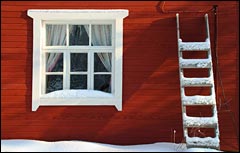Dear Umbra,
We are looking into replacing some of our windows. Any thoughts on which companies are more environmentally friendly, not just in the energy-efficiency of their windows, but in the manufacturing process (Forest Stewardship Council-certified wood, recycling materials, etc.)?
Lyell Slade
Concord, Mass.
Dearest Lyell,
Let’s warm up on this topic: Windows in residential buildings are responsible for about 2 percent of the country’s overall energy usage. Replacing inefficient windows might save you 40 percent of your personal energy costs, depending on your current windows and those with which you replace them. For those in milder climates, it will be less.

No pane, no gain.
Photo: iStockphoto
There are manufacturers who use FSC-certified lumber, and who reuse materials. I can’t name specific companies, but it’s an additional layer of questions for your potential suppliers.
First, as you consider the materials, configuration, glazings, vendors, and price comparison for new windows, you’ll need help from the Efficient Windows Collaborative. A quick surf will give you information about the window components important to your Concordian climate (you can search for advice by state), the money you might save (you can search energy savings according to window type), and the jargon with which you will approach suppliers. In their membership section, you can look for manufacturers in your area with whom the jargon will be useful.
EWC recommends looking for manufacturers who are also members of the American Architectural Manufacturers Association and the Window & Door Manufacturers Association. All these memberships assure you a well-made window whose makers use the National Fenestration Rating Council system, your guide to window efficiency (please see my previous window discussion to catch up).
What you have added to your personal quest is the need to check with one more organization, the Forest Stewardship Council. I suggest that you walk through the EWC site above, decide what type of windows are in your ballpark, narrow it down to a few manufacturers, and then search FSC to see if the manufacturers you have chosen have the FSC stamp of approval. (You could also reverse the search and start with FSC certificates for window makers.)
In regard to reused materials, you will need to ask the suppliers themselves and trust their answers. Your best hope for an easy, no-research-for-you answer is a green-building professional who knows his or her window manufacturers inside and out. (I knew I could eventually open up on some bad window puns.) I do not fit this description. You’ll need a good carpenter in the end, anyway, because shoddy installation will undo all your good work. If you have no place to start looking for that green-building professional — no word-of-mouth contractors, no local eco-building organization — I had a little luck finding leads for you on the Northeast Sustainable Energy Association’s Yellow Pages. Maybe something there would pan out.
Internet resources will get you fairly far along on this project. You will be able to find the windows you seek, and when you do replace your old windows, don’t forget to return to the EWC site and learn how to claim the federal tax credit [PDF] and state and local financial incentives available to you. Ye who dread the cost of window replacement would do well to browse these, too — you might find yourself incentivized.
Glazily,
Umbra

